2024 Product Manager Salary Report in India
Salary insights for the
Indian Product Manager
2024 Product Manager Salary Report in India
Salary insights for the Indian Product Manager
Our Purpose
Why did we build this report?
Our goal with this report was to provide salary benchmarks & career insights for Product Managers in India.
This report will help you understand how your product manager salary compares to the industry standards in India, what can you do to increase your earning potential and how important an MBA is for becoming a product manager.
We hope this report is of value to product managers seeking insights about compensation and strategies to increase their earning potential.
600+
Product Managers
between career levels of Associate Product Manager & Chief Product Officer working across 15+ sectors, in B2B and B2C orgs, have shared their salary data to fuel insights within this report.
9000+
Data Points
were considered to generate product manager salary insights reported here. These data points were collected between January and March of 2024, making it the most accurate representation of the current job market.
Who took our survey?
600+ Product Managers provided their salary across 200+ companies like CRED,
Flipkart, Swiggy, Zomato, Uber, Airbnb and several others
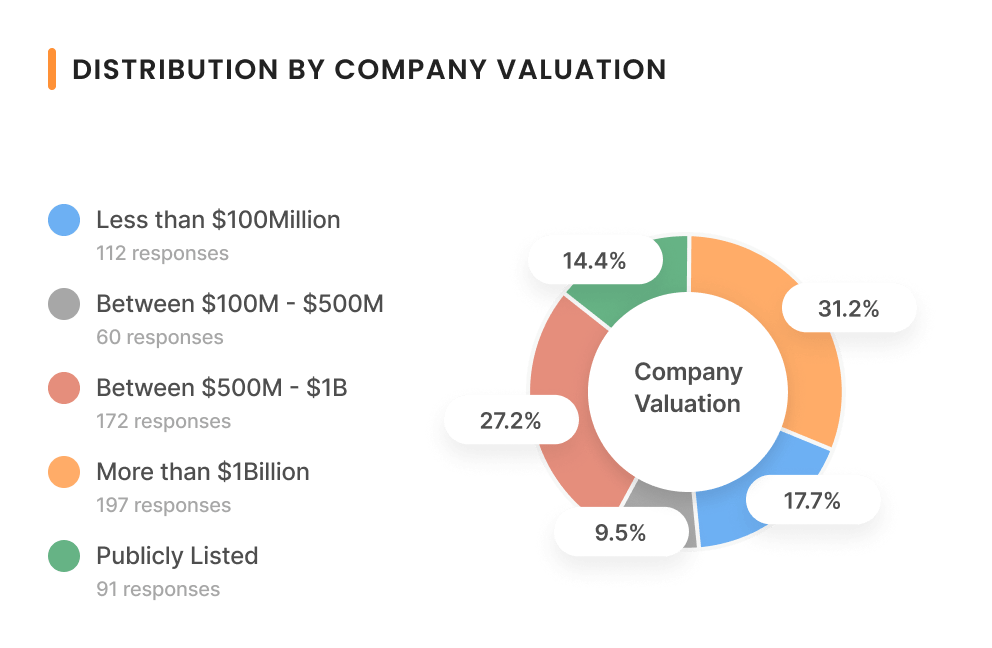
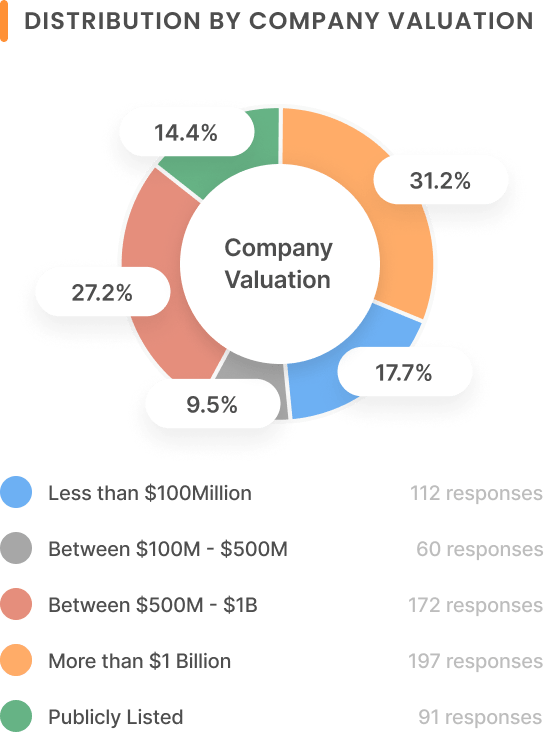
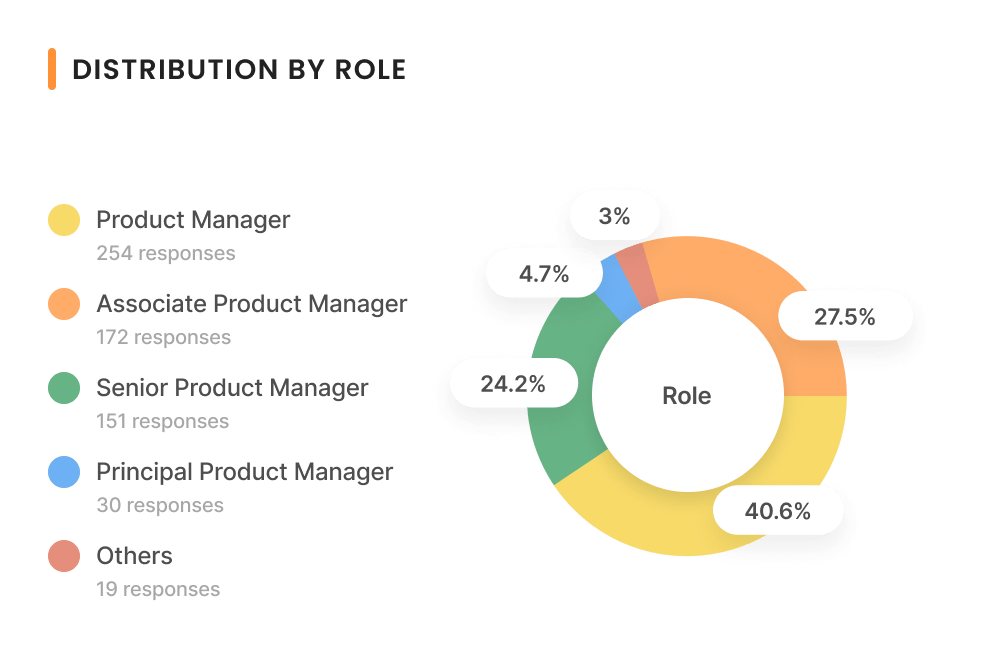
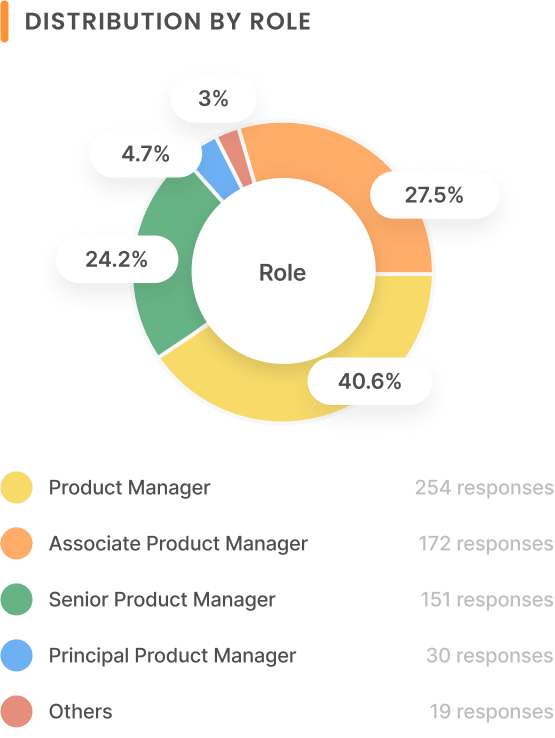
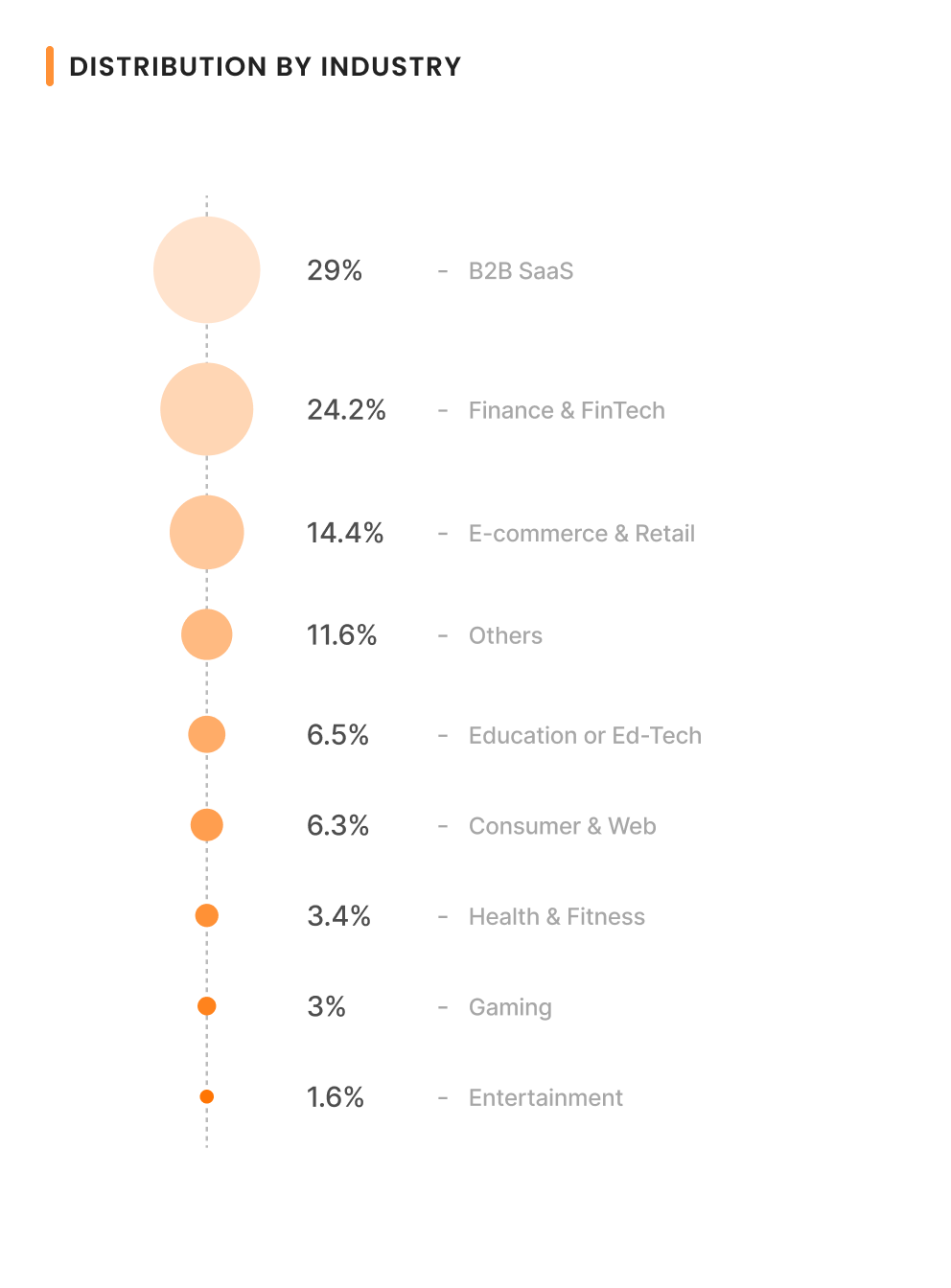
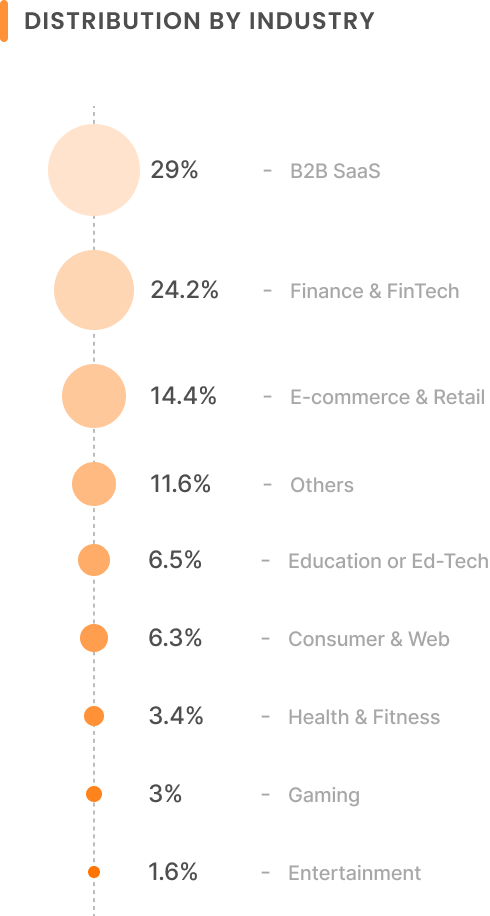
CTC refers to cost to company
It is a sum of fixed pay, ESOPs/RSUs and variable pay
Product Managers see 650% increase
in their median salary in 10 years.
Product Manager salary in India ranges between ₹ 8.0 Lakhs to ₹ 55.0 Lakhs
depending on their years of experience. They get additional ESOPs & variable pay
as part of their salary. Variable pay ranges from ₹ 1.2 Lakhs to ₹ 10 Lakhs.
Product Manager salary in India ranges between ₹ 8.0 Lakhs to ₹ 55.0 Lakhs
depending on their years of experience. They get additional ESOPs & variable pay
as part of their salary. Variable pay ranges from ₹ 1.2 Lakhs to ₹ 10 Lakhs.
Median pay based on years of product management experience
Fixed
ESOPs
Variable
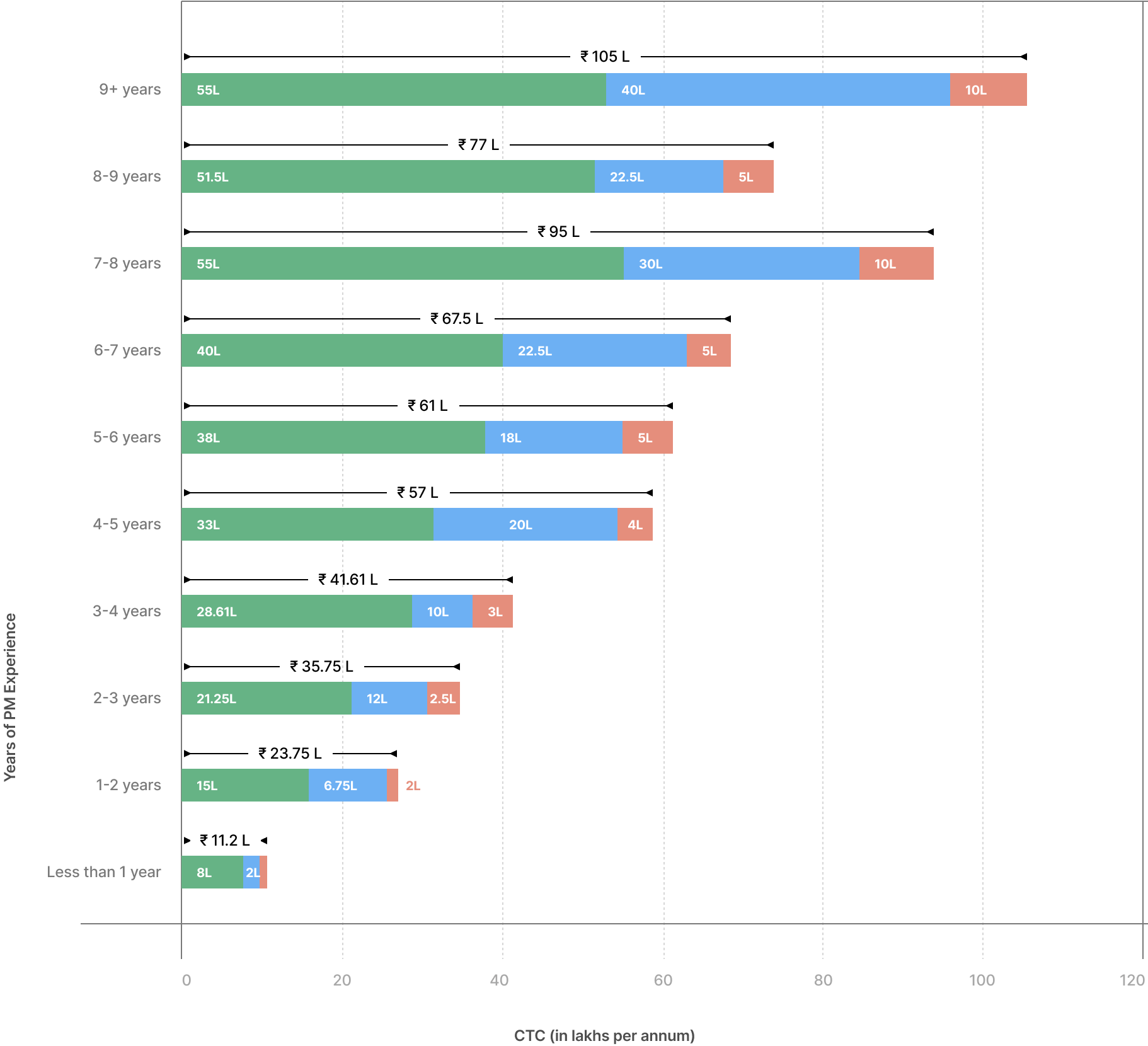
Median pay based on years of product management experience
Fixed
ESOPs
Variable
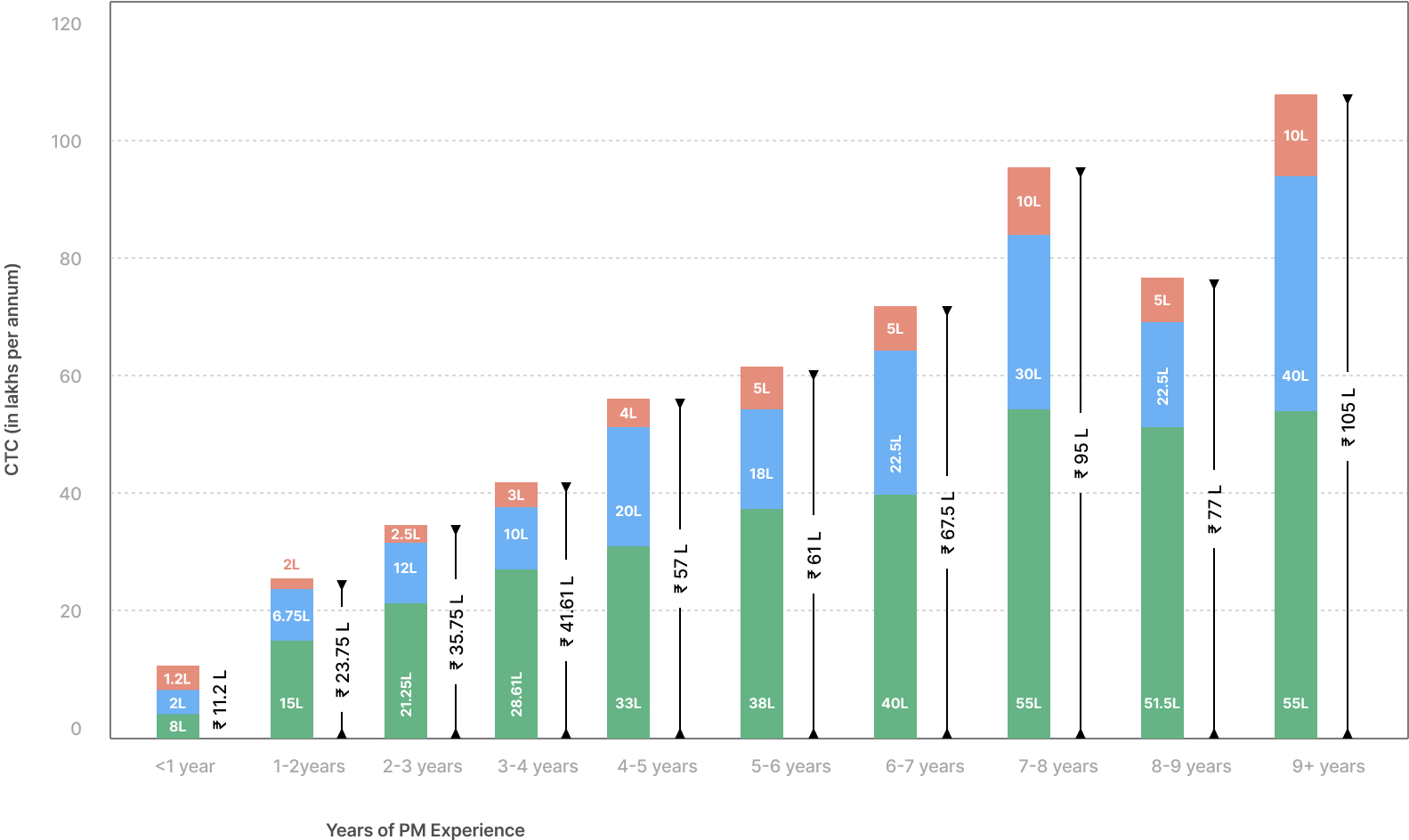
Median pay based on years of product management experience
Years of PM Experience | Fixed Pay | ESOPs | Variable Component | Total CTC | Number of Responses |
|---|---|---|---|---|---|
Less than 1 year | 8 | 2 | 1.2 | 11.2 | 25 |
1-2 years | 15 | 6.75 | 2 | 23.75 | 125 |
2-3 years | 21.25 | 12 | 2.5 | 35.75 | 148 |
3-4 years | 28.61 | 10 | 3 | 41.61 | 98 |
4-5 years | 33 | 20 | 4 | 57 | 65 |
5-6 years | 38 | 18 | 5 | 61 | 47 |
6-7 years | 40 | 22.5 | 5 | 67.5 | 44 |
7-8 years | 55 | 30 | 10 | 95 | 26 |
8-9 years | 51.5 | 22.5 | 5 | 77 | 24 |
9+ years | 55 | 40 | 10 | 105 | 25 |
Note: All values are in lakhs per annum
Note: All values are in lakhs per annum
As your responsibilities grow,
your variable pay and ESOPs grow.
Median Product Manager salary in India starts at ₹ 12 Lakhs and goes up to ₹ 44 Lakhs as they grow into a Senior Product Manager.
Median Product Manager salary in India starts at ₹ 12 Lakhs and goes up to ₹ 44 Lakhs as they grow into a Senior Product Manager.
Median pay based on designation or seniority
Fixed
ESOPs
Variable
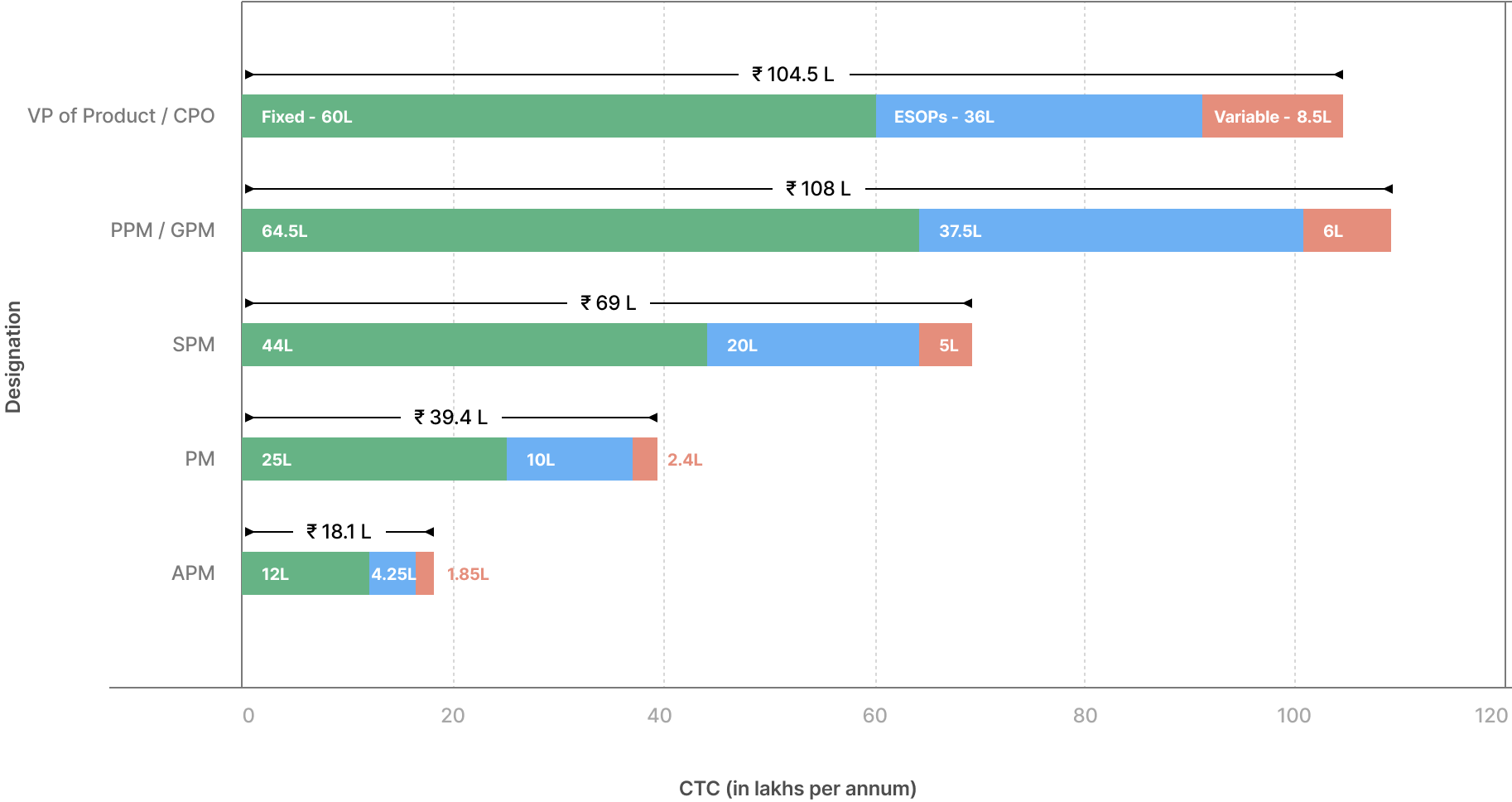
Median pay based on designation or seniority
Fixed
ESOPs
Variable
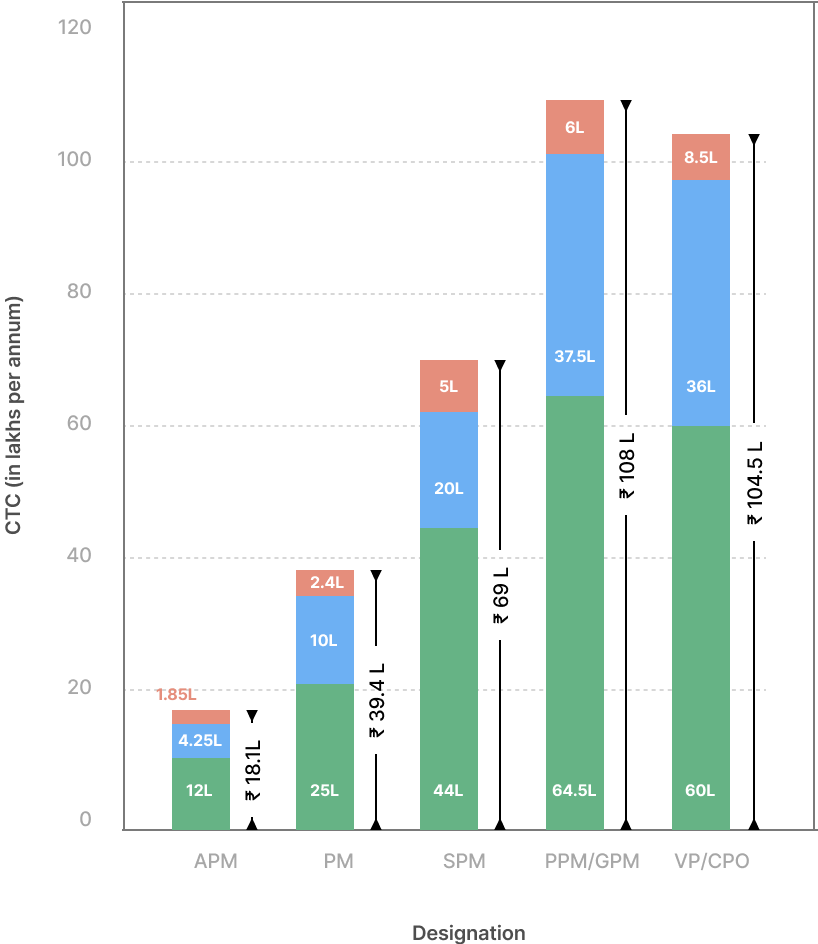
Median pay based on designation or seniority
Designation | Fixed Pay | ESOPs | Variable Component | Total CTC | Top 25 Percentile (CTC) |
|---|---|---|---|---|---|
APM | 12 | 4.25 | 1.85 | 18.1 | 20 |
PM | 25 | 12 | 2.4 | 40 | 43.6 |
SPM | 44 | 20 | 5 | 69 | 76 |
PPM / GPM | 64.5 | 37.5 | 6 | 108 | 172 |
VP of Product / CPO | 60 | 36 | 8.5 | 104.5 | 372 |
Note: All values are in lakhs per annum
Note: All values are in lakhs per annum
If you are looking to make a
transition to product management
This is the sign you were waiting for...
51% APMs got their first product break at
startups with less than $100M in valuation.
Only 15% APMs were able to break into their first job at Unicorns.
Median Salary of Associate Product Managers (APMs)
Company Valuation | Total CTC | Fixed | Variable | ESOP |
|---|---|---|---|---|
< $100M | 12.5 | 9 | 1.5 | 2 |
$100M - $500M | 19.45 | 13.5 | 1.45 | 4.5 |
$500M - $1BN | 21 | 15 | 2 | 4 |
>$1BN | 27 | 17 | 2 | 8 |
Publicly Listed | 28 | 16.4 | 1.6 | 10 |
Note: All values are in lakhs per annum
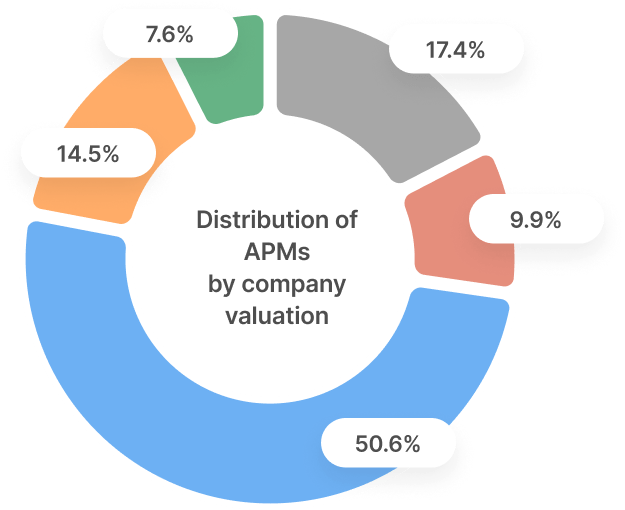
As you gain 2+ years of experience,
breaking into unicorns gets easier.
Median Salary of Product Managers (PMs)
Company Valuation | Total CTC | Fixed | Variable | ESOP |
|---|---|---|---|---|
< $100M | 34 | 22 | 2 | 10 |
$100M - $500M | 30.5 | 22.5 | 2 | 6 |
$500M - $1BN | 49.3 | 27 | 2.3 | 20 |
>$1BN | 44.3 | 27 | 2.3 | 15 |
Publicly Listed | 44.8 | 28.3 | 4 | 12.5 |
Note: All values are in lakhs per annum
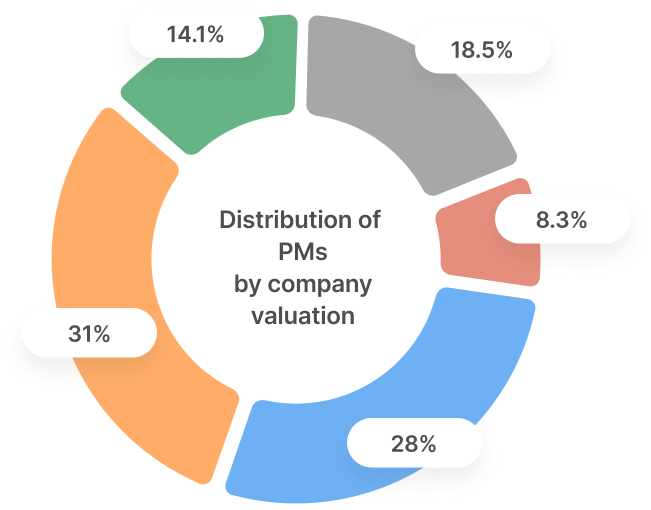
As you gain 5+ years of experience,
breaking into publicly listed companies gets easier.
Median Salary of Senior Product Managers (SPMs)
Company Valuation | Total CTC | Fixed | Variable | ESOP |
|---|---|---|---|---|
< $100M | 50.25 | 32 | 5 | 13.25 |
$100M - $500M | 59.25 | 36.75 | 5 | 17.5 |
$500M - $1BN | 60.5 | 42.5 | 4.5 | 13.5 |
>$1BN | 81 | 46 | 5 | 30 |
Publicly Listed | 74.5 | 45 | 8.5 | 20 |
Note: All values are in lakhs per annum
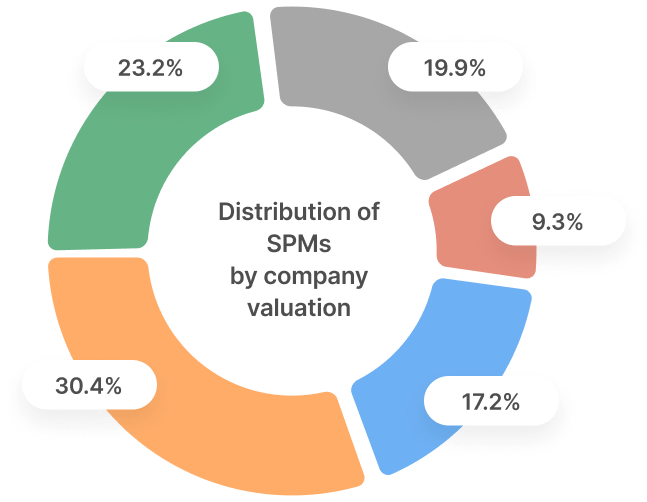
81.5% Product Managers
work from office.
Collaboration and stakeholder management is at the core of a PM job. It's no surprise that 40.7% PMs work from office, and 40.8% PMs have a hybrid work setup.
Remote
18.5 %
In Office
40.7 %
Hybrid
40.8 %
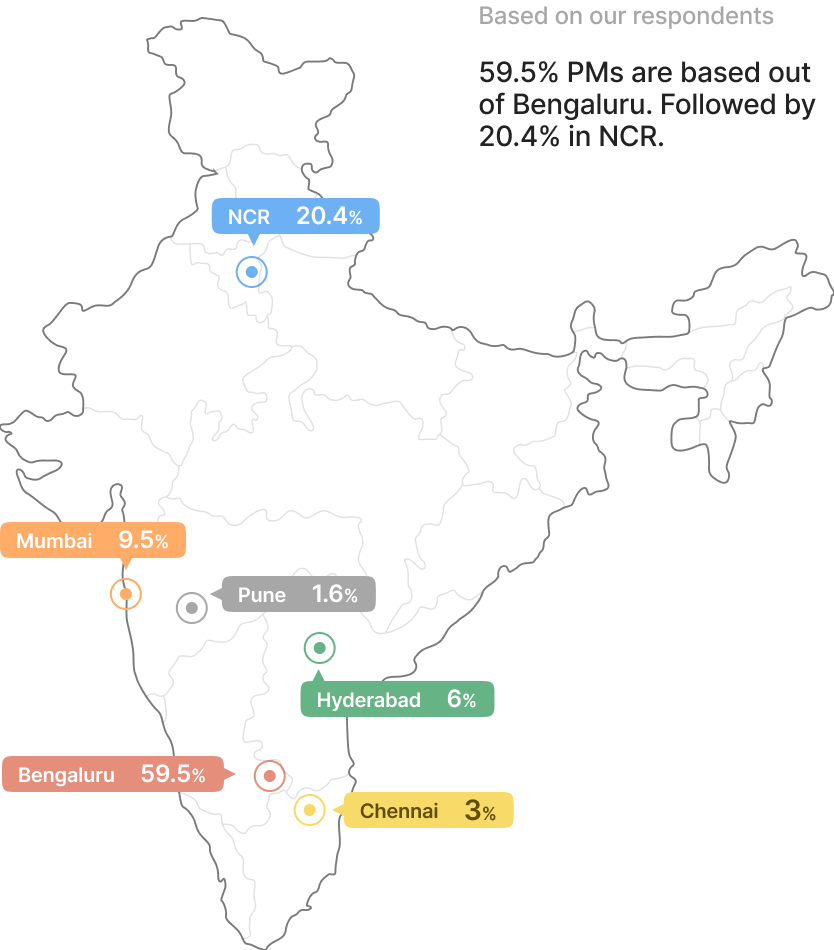
Product Managers in Bengaluru have
20% higher CTCs compared to PMs in
other cities.
Product Manager salary in Bengaluru ranges from ₹ 17 Lakhs to ₹ 75 Lakhs
compared to Mumbai where it ranges from ₹ 8 Lakhs to ₹ 35 Lakhs and NCR
where it ranges from ₹ 12 Lakhs to ₹ 55 Lakhs.
Median CTCs for PMs in different cities
Bengaluru
NCR
Hyderabad
Mumbai
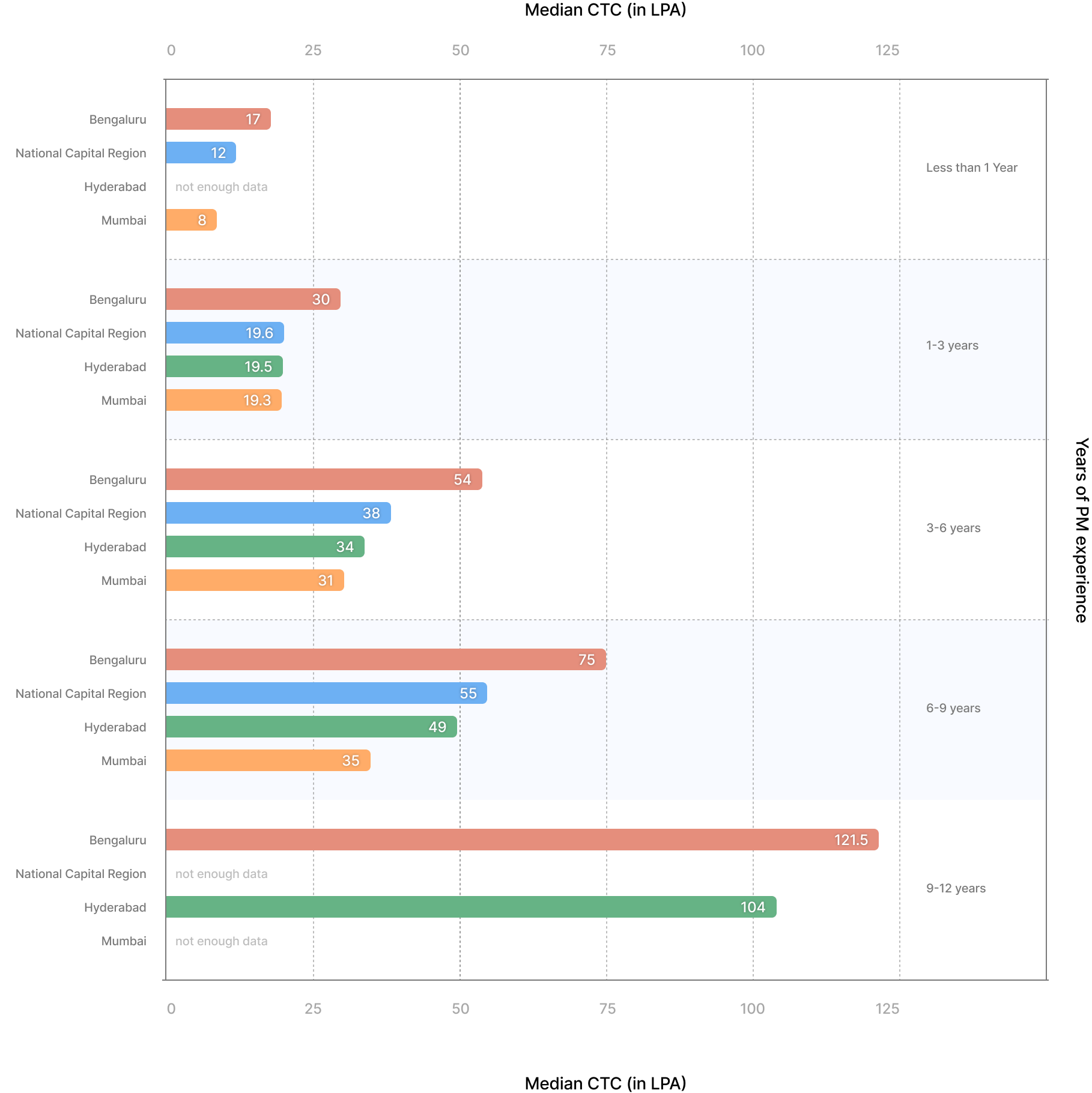
Median CTCs for PMs in different cities
Bengaluru
NCR
Hyderabad
Mumbai
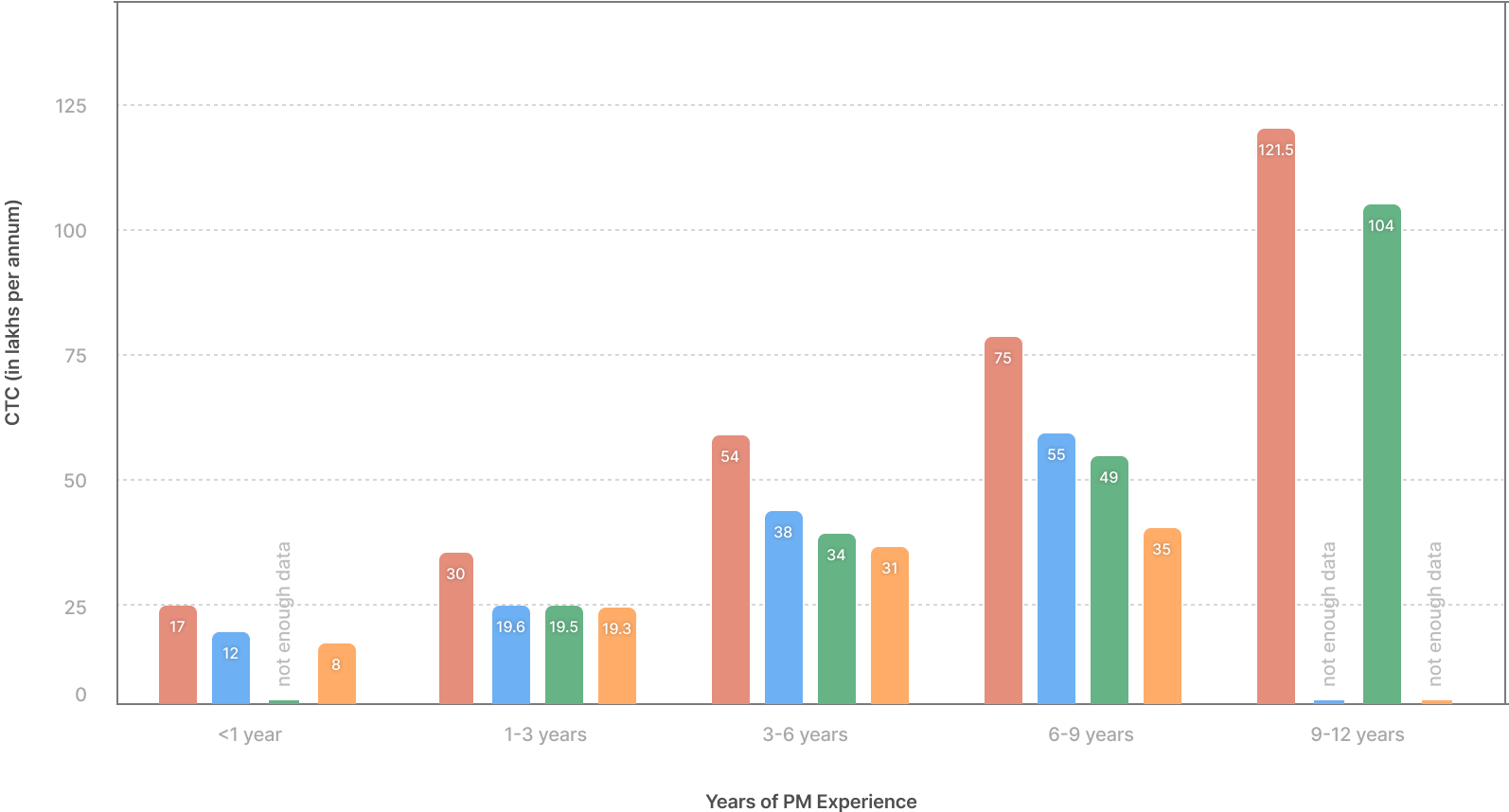
Median CTC of PMs in different cities
Years of PM Experience | Bengaluru | NCR | Hyderabad | Mumbai |
|---|---|---|---|---|
Less than 1 year | 17 | 12 | not enough data | 8 |
1-3 years | 30 | 19.6 | 19.5 | 19.3 |
3-6 years | 54 | 38 | 34 | 31 |
6-9 years | 75 | 55 | 49 | 35 |
9-12 years | 121.5 | not enough data | 104 | not enough data |
Note: All values are in lakhs per annum
Note: All values are in lakhs per annum
Women are paid 14% lower than men
85% of our respondents were male, while 15% were female. Women Product Manager salary in India is 14% lower than men.
Median salaries for both genders based on their years of experience
Male
Female
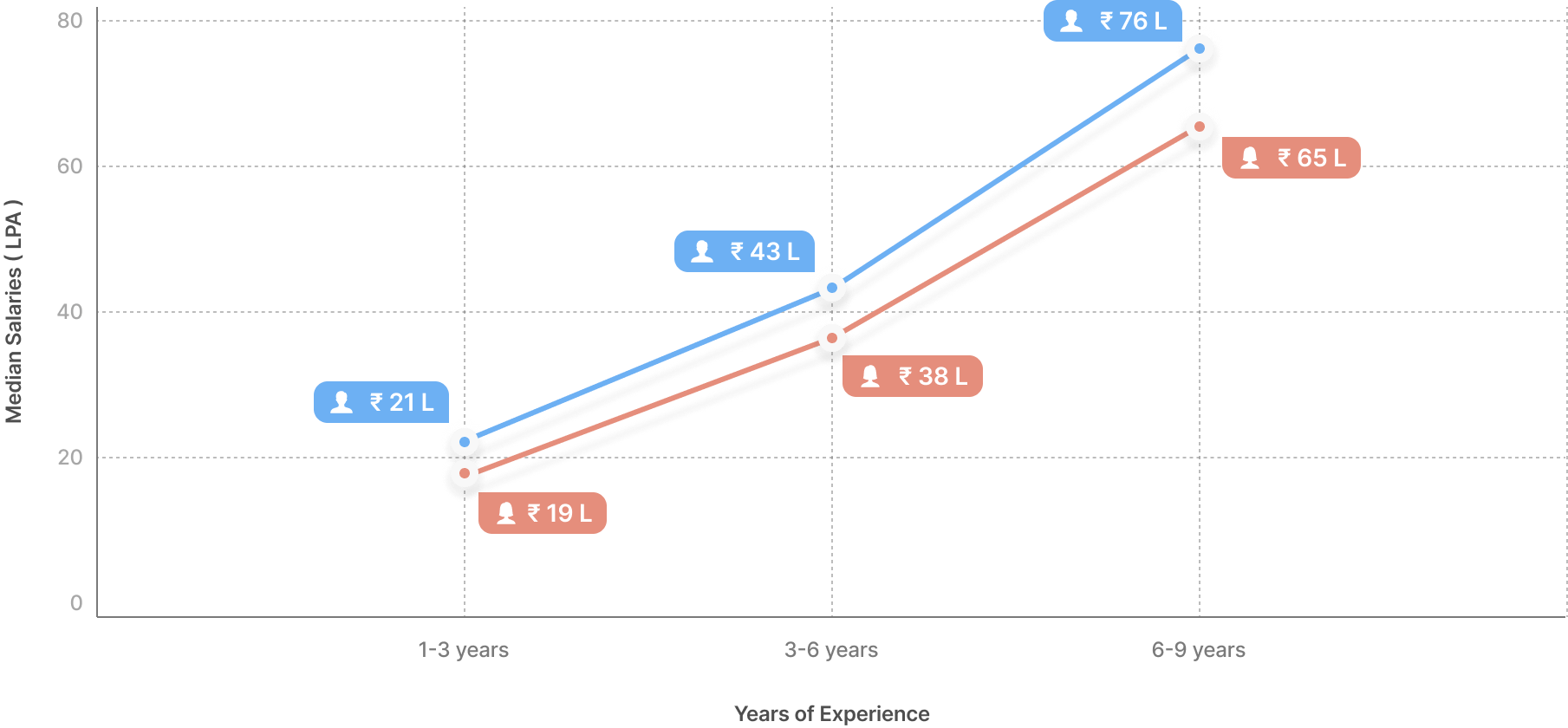
Median salaries for both genders based on their years of experience
Male
Female
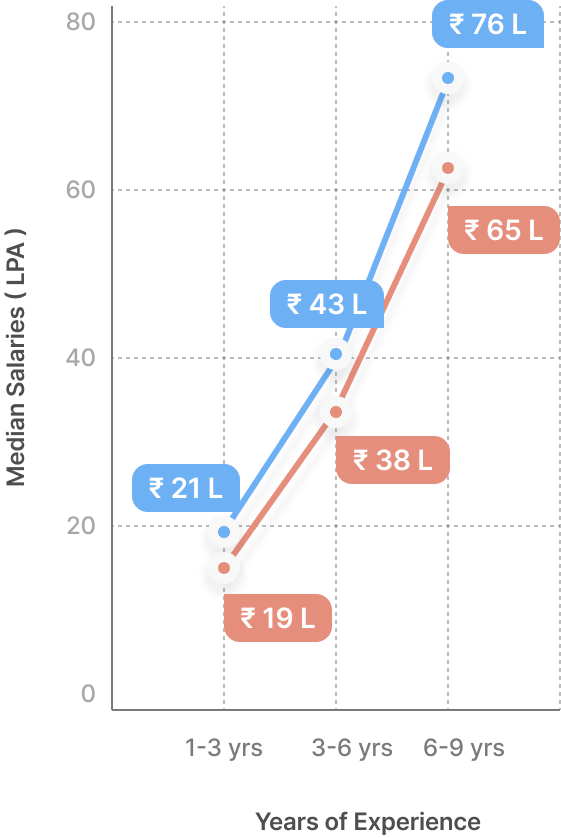
Only 26% of Product Managers were Engineers before.
The remaining 74% is spread across Data Analysts, Strategy & Ops, Program Managers, Sales, Marketing, Consulting and others.
Many of us believe coding experience is required. This data suggests 70%+ PMs do not have coding experience.
The remaining 74% is spread across Data Analysts, Strategy & Ops, Program Managers, Sales, Marketing, Consulting and others.
Many of us believe coding experience is required. This data suggests 70%+ PMs do not have coding experience.
Roles held by our survey respondents before transitioning to product management:
Past Roles | Percentage |
|---|---|
Developer | 26.22 % |
Business / Data Analyst | 21.11 % |
Strategy & Operations | 11.37 % |
Project / Program Manager | 10.21 % |
Others | 10.21 % |
Consultant | 8.12 % |
Marketing | 6.96 % |
Sales | 4.18 % |
Entrepreneur | 1.62 % |
Note: Others consists of various roles like curriculum designers, interior designers, finance, and many more.
If you are looking to make a
transition to product management
This is the sign you were waiting for...
Switch to Product within the initial
6 years to minimize pay cut.
Deciding when to transition to product management can be challenging.
Deciding when to transition to product management can be challenging.
Based on the salary data of our survey respondents, we see:
a.
People who transition between 1-3 years of experience are paid 8% lower than the median salary of a product manager.
b.
People who transition between 3-6 years of experience are paid 15% lower than the median salary of a product manager.
c.
People who transition between 6-9 years of experience are paid 30% lower than the median salary of a product manager.
Median CTC (fixed + variable + ESOPs) of PMs from various backgrounds based on total work experience:
Previous Role | 1 - 3 years | 3 - 6 years | 6 - 9 years |
|---|---|---|---|
Median CTC (for comparison) | 33.4 | 61.75 | 86 |
Sales | 18.56 | 32.8 | 43.88 |
Marketing | 22.27 | 40.52 | 56.16 |
Strategy & Operations | 25.98 | 42.45 | 57.92 |
Business/Data Analyst | 25.98 | 46.31 | 63.18 |
Project/Program Manager | 29.69 | 54.03 | 61.43 |
Developer | 29.69 | 54.03 | 70.2 |
Note: All values are in lakhs per annum
Note: All values are in lakhs per annum
Myth or Reality: You need to have an MBA to become a Product Manager.
Only 36.1% of our respondents
have an MBA prior to becoming a PM
There's no single degree that prepares you to become a product manager.
56.6% of PMs who took our survey only have a bachelor's degree and only 36.1% have an MBA.
Myth or Reality: You need to have an MBA to become a Product Manager.
Only 36.1% of our respondents have an MBA prior to becoming a PM
There's no single degree that prepares you to become a product manager. 56.6% of PMs who took our survey only have a bachelor's degree and only 36.1% have an MBA.
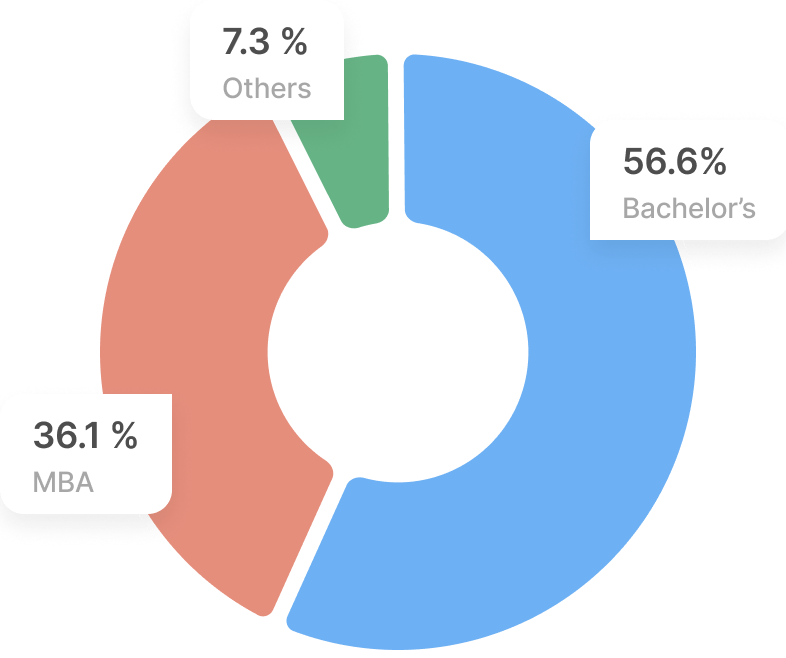

Median CTCs for PMs based on highest education qualification:
Years of PM Experience | PMs with only a Bachelor's degree | PMs with an MBA | PMs with other Master's degrees |
|---|---|---|---|
Less than 1 year | 8.25 | 12 | 7.6 |
1-3 years | 22 | 32.5 | 18 |
3-6 years | 44 | 46 | 29 |
6-9 years | 75 | 58 | not enough data |
9-12 years | 133 | 96 | not enough data |
Note: All values are in lakhs per annum
Note: All values are in lakhs per annum
Gaming & Entertainment pay
20% premium to their PMs.
This data can be used to answer → Does your pay really depend on the industry you work in?
Key observations:
- E-commerce, FinTech and Consumer Web industries pay 15% more than the median product management salary.
- Specialising in the gaming or media industry pays 20% more than the median salary.
Years of Product Management Experience | 1 - 3 years | 3 - 6 years | 6 - 9 years |
|---|---|---|---|
Median CTC (in LPA) | 33.4 | 61.75 | 86 |
15% Premium - (E-commerce/Consumer Web/FinTech) Median CTC (in LPA) | 38.41 | 69.78 | 96.32 |
20% Premium (Gaming/Media & Entertainment) Median CTC (in LPA) | 39.75 | 72.25 | 103 |
Difference in salaries based on industry
Median PM Salary
15% Premium
20% Premium
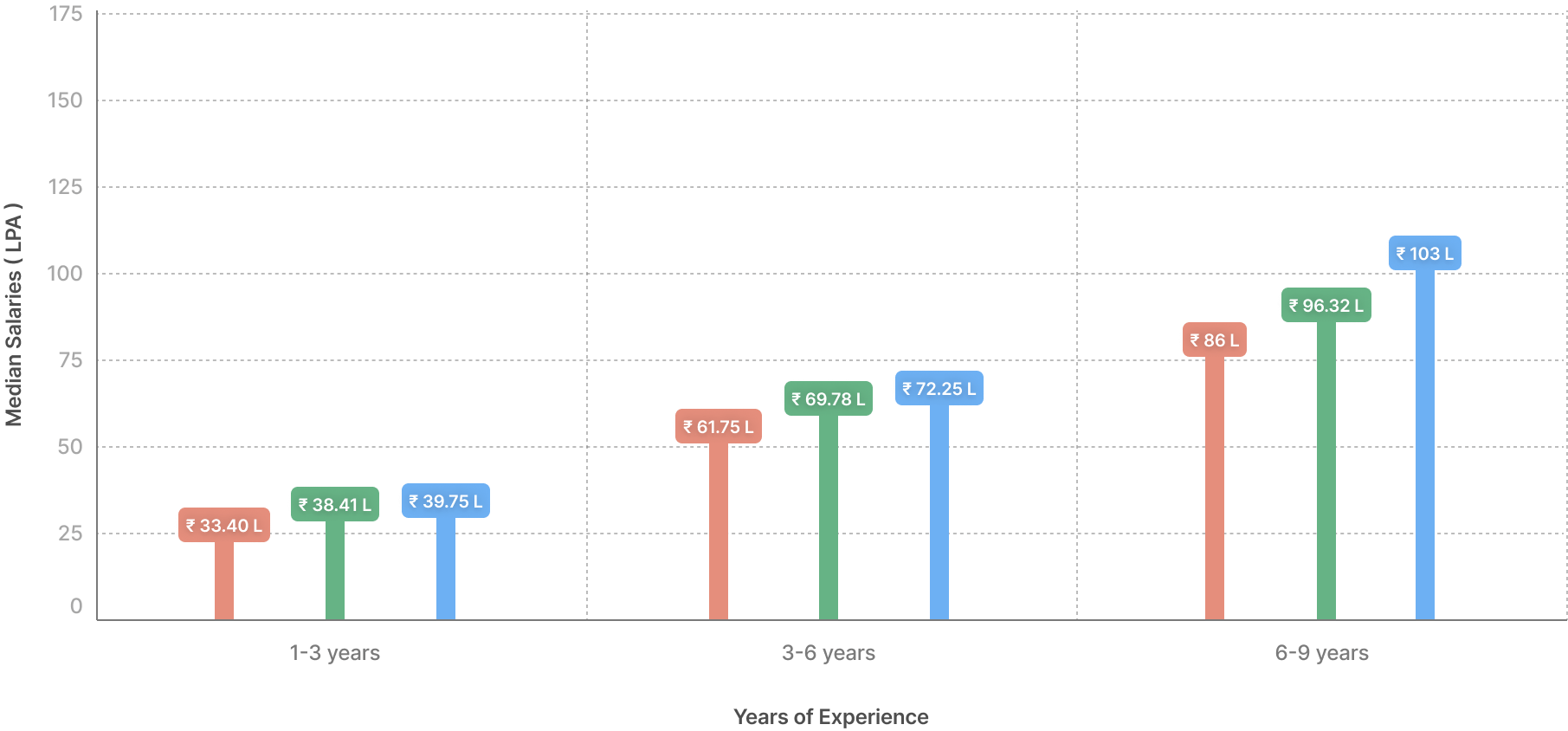
Difference in salaries based on industry
Median
15% Premium
20% Premium
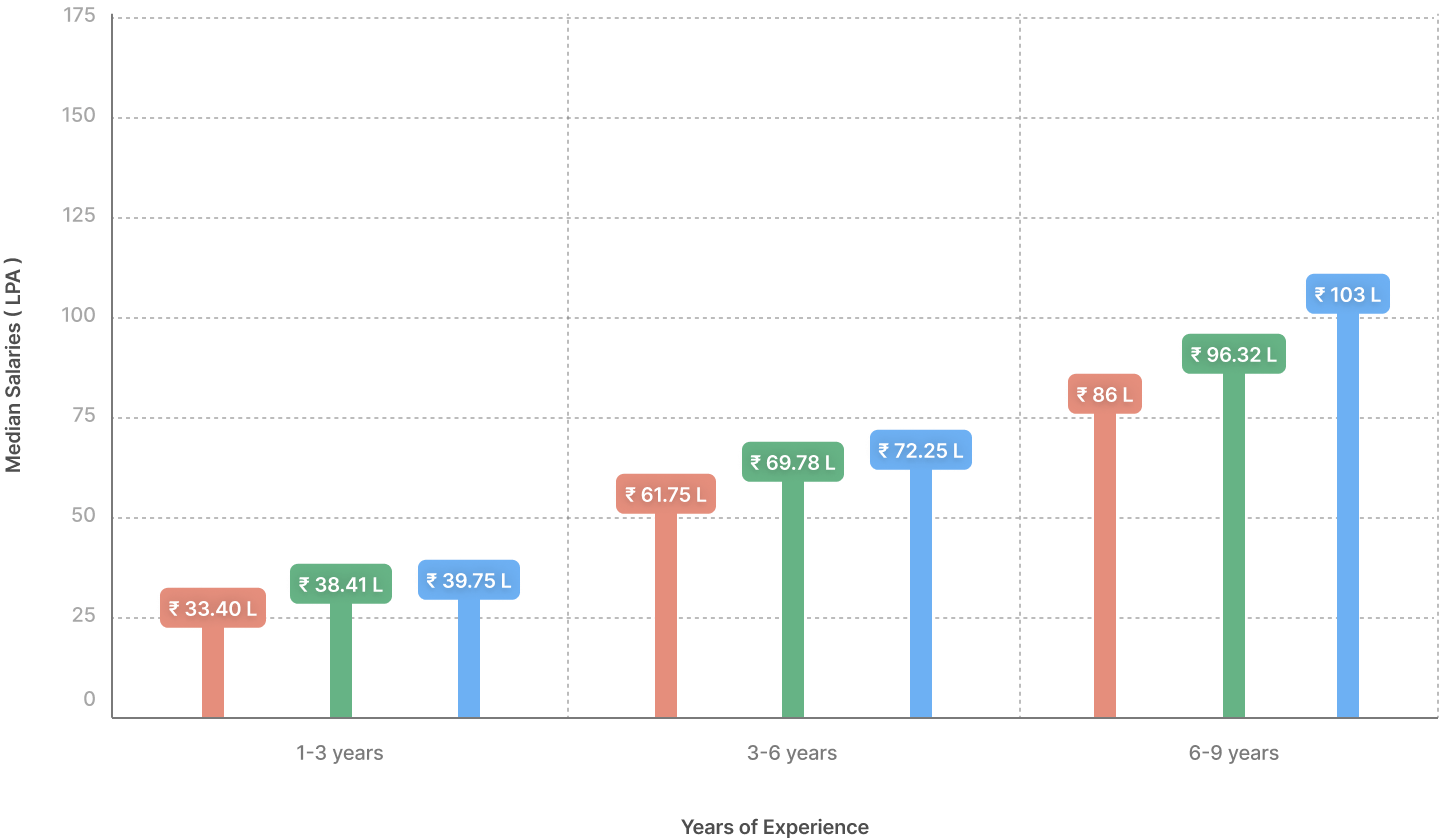
What kind of Product Managers
make a salary of 50 Lakhs?
12%
have designation of a PM. Rest are SPM or above.
25%
have less than 3 years of experience.
90%
are men.
50%
don't have an MBA.
60%
work with unicorns or publicly listed companies.
What kind of Product Managers
make a salary of 1 Crore?
40%
are SPMs with 6+ years of PM experience.
89%
are men.
54%
don't have an MBA.
70%
work with unicorns or publicly listed companies.